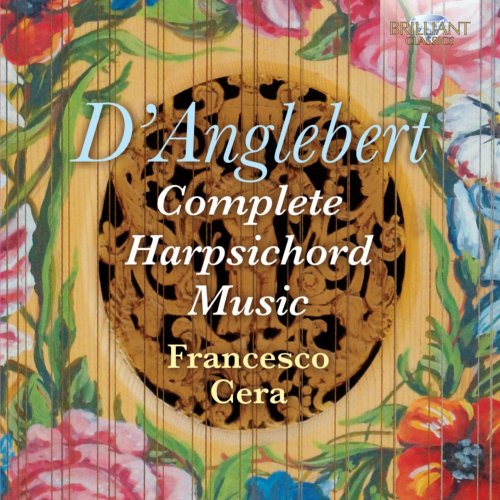
Francesco Cera - D'Anglebert: Complete Harpsichord Music (2014)
BAND/ARTIST: Francesco Cera
- Title: D'Anglebert: Complete Harpsichord Music
- Year Of Release: 2014
- Label: Brilliant Classics
- Genre: Classical
- Quality: FLAC (image + .cue, log, scans)
- Total Time: 2:53:42
- Total Size: 1.13 GB
- WebSite: Album Preview
Tracklist:
Jean-Henri d'Anglebert (1629-1691)
CD 1
01 - 13] Suite in G major
14 - 21] Suite in G minor
CD 2
01 - 12] Suite in D minor
13 - 19] Suite in D major
CD 3
01] Overture de Cadmus
02] Ritournelle des Fees de Roland
03] Menuet 'Dans nos bois'
04] Chaconne de Phaeton
05] Courante de Lully
06] Double de la Courante
07] Sarabande 'Dieu des Enfers'
08] Gigue de Lully
09] Menuet 'La Jeune Iris'
10] Gavotte 'Ou estes vous alle' - Air ancien
11] Gavotte 'Le Beau Berger Tirsis' - Air ancien
12] La Bergere Annette - Vaudeville
13] Ouverture de la Mascarade
14] Les Sourdines d'Armide
15] Les Songes agreables d'Atys
16] Air d'Apollon du Triomphe de l'Amour
17] Menuet de Poitou - Vaudeville
18] Passacaille d'Armide
19] Ouverture de Proserpine
20] Chaconne de Galatee
21 - 25] Pieces in C major
Jean-Henri d'Anglebert (1629-1691)
CD 1
01 - 13] Suite in G major
14 - 21] Suite in G minor
CD 2
01 - 12] Suite in D minor
13 - 19] Suite in D major
CD 3
01] Overture de Cadmus
02] Ritournelle des Fees de Roland
03] Menuet 'Dans nos bois'
04] Chaconne de Phaeton
05] Courante de Lully
06] Double de la Courante
07] Sarabande 'Dieu des Enfers'
08] Gigue de Lully
09] Menuet 'La Jeune Iris'
10] Gavotte 'Ou estes vous alle' - Air ancien
11] Gavotte 'Le Beau Berger Tirsis' - Air ancien
12] La Bergere Annette - Vaudeville
13] Ouverture de la Mascarade
14] Les Sourdines d'Armide
15] Les Songes agreables d'Atys
16] Air d'Apollon du Triomphe de l'Amour
17] Menuet de Poitou - Vaudeville
18] Passacaille d'Armide
19] Ouverture de Proserpine
20] Chaconne de Galatee
21 - 25] Pieces in C major
Despite the fact that he came from a modest background, the composer and harpsichordist Jean-Henri d’Anglebert managed to carve out an impressive career for himself in 17th-century Paris, which culminated with his appointment as harpsichordist at the court of King Louis XIV. His musical style is characterised by a rich and expressive contrapuntal and harmonic language, as well as lavish ornamentation.
The four Suites heard here constitute D’Anglebert’s Pièces de Clavecin, which represent one of the most significant musical achievements of the second half of the 17th century. It is the composer’s magnum opus, in which he took what he had learnt about the French school of composition and performance from his predecessor at Louis XIV’s court, the highly influential Jacques Champion de Chambonnières, and enhanced it with his unique artistry. His sophisticated ornamentation was unprecedented at the time and posed a real challenge for performers. Other remarkable features of the Suites include striking examples of the Prélude non mesuré (written without rhythm or metre indications), solemn and meditative Gaillardes and Passacailles contrasted with lively Correnti and Gigues, and an intimate homage to Chambonnières which closes the fourth Suite. The Lully transcriptions showcase D’Anglebert’s admiration for, and close affinity with, the composer – he played the harpsichord in many of the performances of Lully’s tragédies lyriques – and invest what was the widespread and sometimes commonplace practice of transcription with a much greater artistic value, using the harpsichord to suggest orchestral textures.
D’Anglebert’s complete harpsichord works are performed by early music specialist Francesco Cera, who regularly appears with leading early music ensembles and has been acclaimed for his ‘great intelligence’ and ‘impeccable interpretative command’ (Amadeus).
The four Suites heard here constitute D’Anglebert’s Pièces de Clavecin, which represent one of the most significant musical achievements of the second half of the 17th century. It is the composer’s magnum opus, in which he took what he had learnt about the French school of composition and performance from his predecessor at Louis XIV’s court, the highly influential Jacques Champion de Chambonnières, and enhanced it with his unique artistry. His sophisticated ornamentation was unprecedented at the time and posed a real challenge for performers. Other remarkable features of the Suites include striking examples of the Prélude non mesuré (written without rhythm or metre indications), solemn and meditative Gaillardes and Passacailles contrasted with lively Correnti and Gigues, and an intimate homage to Chambonnières which closes the fourth Suite. The Lully transcriptions showcase D’Anglebert’s admiration for, and close affinity with, the composer – he played the harpsichord in many of the performances of Lully’s tragédies lyriques – and invest what was the widespread and sometimes commonplace practice of transcription with a much greater artistic value, using the harpsichord to suggest orchestral textures.
D’Anglebert’s complete harpsichord works are performed by early music specialist Francesco Cera, who regularly appears with leading early music ensembles and has been acclaimed for his ‘great intelligence’ and ‘impeccable interpretative command’ (Amadeus).
Related Release:
Classical | FLAC / APE | CD-Rip
As a ISRA.CLOUD's PREMIUM member you will have the following benefits:
- Unlimited high speed downloads
- Download directly without waiting time
- Unlimited parallel downloads
- Support for download accelerators
- No advertising
- Resume broken downloads


